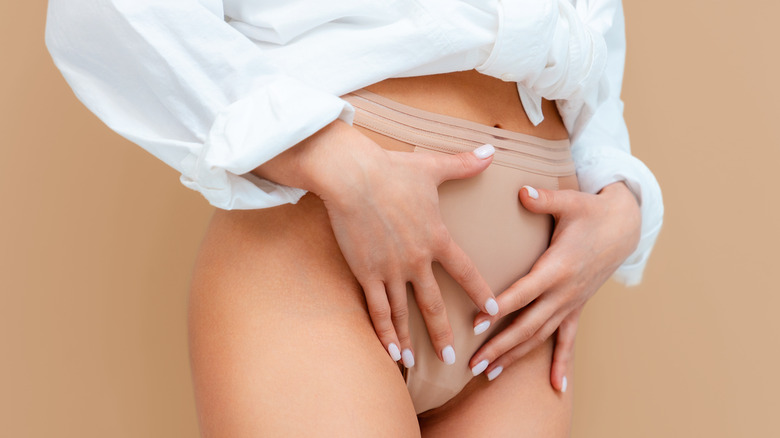Can Boric Acid Help Treat Yeast Infections?
Boric acid is a white, crystalline powder that is soluble in water and has a slightly bitter taste. In medicine, boric acid is often used as an antiseptic and has antiviral and antifungal properties, per the source. According to some experts, this acid can potentially treat a vaginal yeast infection, also known as vulvovaginal candidiasis. It's a common type of fungal infection that affects the vaginal area, caused by an overgrowth of the yeast-like fungus Candida. It normally lives in the body in small amounts, according to the Mayo Clinic.
Vaginal yeast infections are commonly characterized by itching, burning, and pain in the vaginal area, along with thick, white discharge that may have a cottage cheese-like appearance. Other noted symptoms may include redness and swelling of the vulva, and painful or uncomfortable sexual intercourse. Treatment of the condition often involves medical intervention. However, some believe boric acid might be able to help.
Can boric acid help treat yeast infections?
Boric acid is sometimes used to treat yeast infections because it has antimicrobial properties. According to the University of Washington, boric acid is an ideal treatment option for treating two types of yeasts associated with vaginal yeast infections: Candida tropicalis and Candida glabrata. A 2019 study published in the journal Sexually Transmitted Diseases reiterates this claim, touting boric acid as an effective treatment option. When used to treat yeast infections, boric acid is typically inserted into the vagina as a suppository, according to Healthline. This can help restore the natural pH balance of the vagina and kill the overgrowth of yeast that is causing the infection.
It is vital to note that boric acid should not be used internally and should only be used as directed by a medical professional. This is even more important if you're pregnant, as it's generally not recommended for use during pregnancy.
How are yeast infections treated?
If left untreated, a yeast infection can worsen and become more difficult to treat, so it is important to speak to your doctor to explore treatment options. While boric acid can be effective in treating yeast infections, your doctor might not recommend it as a first-line treatment. According to the Mayo Clinic, the type of treatment will depend on the severity and location of the infection. Yeast infections are traditionally treated with antifungal medications.
These can be in the form of topical creams, ointments, or suppositories that are applied directly to the affected area. Oral medications may also be an option. Topical treatments for yeast infections include miconazole, while oral medications for yeast infections include fluconazole. In addition to antifungal medications, some home remedies may help alleviate yeast infection symptoms. These include wearing loose-fitting clothing and avoiding certain feminine products, such as tampons. Your doctor can provide you with more guidance on relieving symptoms.



